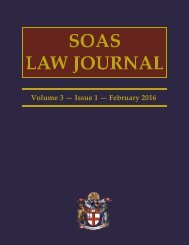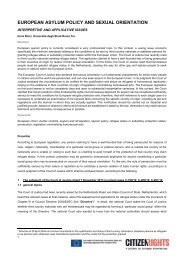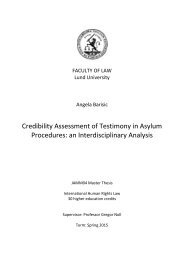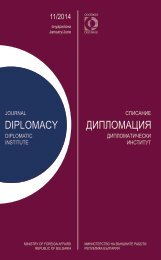AEMI
AEMI-2016-web
AEMI-2016-web
You also want an ePaper? Increase the reach of your titles
YUMPU automatically turns print PDFs into web optimized ePapers that Google loves.
168 <strong>AEMI</strong> JOURNAL 2015 2016<br />
This gap results firstly from the weakness<br />
of definitions of the legal grounds<br />
on the European level allowing Member<br />
States to abuse their expulsion power.<br />
Furthermore recent events showed the<br />
necessity of a deeper reflection on the<br />
right of residence of economically inactive<br />
Union citizens as well as on their<br />
access to social assistance.<br />
1. A Better Definition of Legal<br />
Grounds Allowing Expulsion of<br />
Union Citizens<br />
Legal grounds allowing expulsion of<br />
Union citizens are either not defined or<br />
are defined too generally in the Citizenship<br />
Directive and in the relevant treaties.<br />
Large leeway is given to individual<br />
Member States. This leads to a multiplicity<br />
and diversity of national definitions<br />
which is endangering:<br />
· Legal security, because there is a<br />
clear risk of abuse of expulsions powers<br />
by the Member States.<br />
· The uniformity of application of<br />
the law of the Union, because it is not<br />
realized in practice.<br />
· The principle of equality of<br />
treatment between Union citizens on<br />
the move, because for example, a Union<br />
citizen can be expelled in France on<br />
the ground of renewing stays of three<br />
months while he would not be expelled,<br />
for the same facts, in the Czech Republic.<br />
In the Chakroun case (point 34) 27 , the<br />
Commission submits that the discretion<br />
left to the Member States in implementing<br />
the Directive must not adversely<br />
affect its objectives or effectiveness. National<br />
practises show that national implementations<br />
are often affecting the<br />
Directive’s objective and effectivness.<br />
For these reasons, it would be desirable<br />
to unify national definitions of legal<br />
grounds leading to expulsion orders.<br />
And if states‘ sovereignity does not allow<br />
such step, it would be at least desirable<br />
to establish limits to national discretion.<br />
2. The Exceptional Use of the Expulsion<br />
Sanction<br />
Sanctions deriving from a violation of<br />
the provisions of the Citizenship Directive<br />
can range from a simple refusal<br />
of social assistance to expulsion. Expulsion<br />
is the most severe sanction that<br />
can be used against mobile Union citizens.<br />
As Recitals 23 and 24 of Directive<br />
2004/38/EC state, expulsions can<br />
seriously harm the migrants and, for<br />
this reason, should be used only exceptionally<br />
against mobile Union citizens.<br />
The Observatoire des politiques Sociales en<br />
Europe reminds us that the notion of expulsion<br />
today, which is so easily associated<br />
to the destiny of Union citizens, is<br />
really scaring because it is something so<br />
close to us all and could happen to every<br />
one of us 28 . Likewise, as Professor Lhernoud<br />
already proposed, a clarification of<br />
the consequences of unlawful stays of<br />
Union citizens is needed, knowing that<br />
the ultimate sanction, i.e. the expulsion,<br />
should be avoided as much as possible 29 .<br />
National practices however show the<br />
contrary: expulsion orders being used<br />
on a large scale, without attempting first<br />
to regulate the problematic situation by<br />
less severe sanctions like the refusal of<br />
social assistance.<br />
Moreover, expulsion can only be used<br />
within the allowed scope of EU law<br />
(threat to public order or security, threat<br />
to public health, unreasonable burden<br />
on the social assistance system, abuse of









